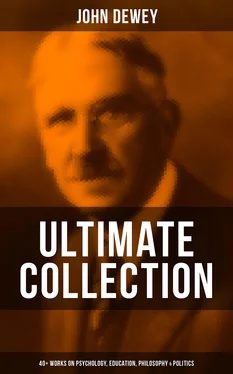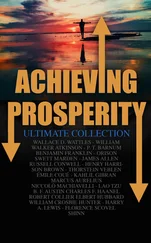We are thus compelled to recognize that within even the most social group there are many relations which are not as yet social. A large number of human relationships in any social group are still upon the machine-like plane. Individuals use one another so as to get desired results, without reference to the emotional and intellectual disposition and consent of those used. Such uses express physical superiority, or superiority of position, skill, technical ability, and command of tools, mechanical or fiscal. So far as the relations of parent and child, teacher and pupil, employer and employee, governor and governed, remain upon this level, they form no true social group, no matter how closely their respective activities touch one another. Giving and taking of orders modifies action and results, but does not of itself effect a sharing of purposes, a communication of interests.
Not only is social life identical with communication, but all communication (and hence all genuine social life) is educative. To be a recipient of a communication is to have an enlarged and changed experience. One shares in what another has thought and felt and in so far, meagerly or amply, has his own attitude modified. Nor is the one who communicates left unaffected. Try the experiment of communicating, with fullness and accuracy, some experience to another, especially if it be somewhat complicated, and you will find your own attitude toward your experience changing; otherwise you resort to expletives and ejaculations. The experience has to be formulated in order to be communicated. To formulate requires getting outside of it, seeing it as another would see it, considering what points of contact it has with the life of another so that it may be got into such form that he can appreciate its meaning. Except in dealing with commonplaces and catch phrases one has to assimilate, imaginatively, something of another's experience in order to tell him intelligently of one's own experience. All communication is like art. It may fairly be said, therefore, that any social arrangement that remains vitally social, or vitally shared, is educative to those who participate in it. Only when it becomes cast in a mold and runs in a routine way does it lose its educative power.
In final account, then, not only does social life demand teaching and learning for its own permanence, but the very process of living together educates. It enlarges and enlightens experience; it stimulates and enriches imagination; it creates responsibility for accuracy and vividness of statement and thought. A man really living alone (alone mentally as well as physically) would have little or no occasion to reflect upon his past experience to extract its net meaning. The inequality of achievement between the mature and the immature not only necessitates teaching the young, but the necessity of this teaching gives an immense stimulus to reducing experience to that order and form which will render it most easily communicable and hence most usable.
3. The Place of Formal Education. There is, accordingly, a marked difference between the education which every one gets from living with others, as long as he really lives instead of just continuing to subsist, and the deliberate educating of the young. In the former case the education is incidental; it is natural and important, but it is not the express reason of the association. While it may be said, without exaggeration, that the measure of the worth of any social institution, economic, domestic, political, legal, religious, is its effect in enlarging and improving experience; yet this effect is not a part of its original motive, which is limited and more immediately practical. Religious associations began, for example, in the desire to secure the favor of overruling powers and to ward off evil influences; family life in the desire to gratify appetites and secure family perpetuity; systematic labor, for the most part, because of enslavement to others, etc. Only gradually was the by-product of the institution, its effect upon the quality and extent of conscious life, noted, and only more gradually still was this effect considered as a directive factor in the conduct of the institution. Even today, in our industrial life, apart from certain values of industriousness and thrift, the intellectual and emotional reaction of the forms of human association under which the world's work is carried on receives little attention as compared with physical output.
But in dealing with the young, the fact of association itself as an immediate human fact, gains in importance. While it is easy to ignore in our contact with them the effect of our acts upon their disposition, or to subordinate that educative effect to some external and tangible result, it is not so easy as in dealing with adults. The need of training is too evident; the pressure to accomplish a change in their attitude and habits is too urgent to leave these consequences wholly out of account. Since our chief business with them is to enable them to share in a common life we cannot help considering whether or no we are forming the powers which will secure this ability. If humanity has made some headway in realizing that the ultimate value of every institution is its distinctively human effect—its effect upon conscious experience—we may well believe that this lesson has been learned largely through dealings with the young.
We are thus led to distinguish, within the broad educational process which we have been so far considering, a more formal kind of education—that of direct tuition or schooling. In undeveloped social groups, we find very little formal teaching and training. Savage groups mainly rely for instilling needed dispositions into the young upon the same sort of association which keeps adults loyal to their group. They have no special devices, material, or institutions for teaching save in connection with initiation ceremonies by which the youth are inducted into full social membership. For the most part, they depend upon children learning the customs of the adults, acquiring their emotional set and stock of ideas, by sharing in what the elders are doing. In part, this sharing is direct, taking part in the occupations of adults and thus serving an apprenticeship; in part, it is indirect, through the dramatic plays in which children reproduce the actions of grown-ups and thus learn to know what they are like. To savages it would seem preposterous to seek out a place where nothing but learning was going on in order that one might learn.
But as civilization advances, the gap between the capacities of the young and the concerns of adults widens. Learning by direct sharing in the pursuits of grown-ups becomes increasingly difficult except in the case of the less advanced occupations. Much of what adults do is so remote in space and in meaning that playful imitation is less and less adequate to reproduce its spirit. Ability to share effectively in adult activities thus depends upon a prior training given with this end in view. Intentional agencies—schools—and explicit material—studies—are devised. The task of teaching certain things is delegated to a special group of persons.
Without such formal education, it is not possible to transmit all the resources and achievements of a complex society. It also opens a way to a kind of experience which would not be accessible to the young, if they were left to pick up their training in informal association with others, since books and the symbols of knowledge are mastered.
But there are conspicuous dangers attendant upon the transition from indirect to formal education. Sharing in actual pursuit, whether directly or vicariously in play, is at least personal and vital. These qualities compensate, in some measure, for the narrowness of available opportunities. Formal instruction, on the contrary, easily becomes remote and dead—abstract and bookish, to use the ordinary words of depreciation. What accumulated knowledge exists in low grade societies is at least put into practice; it is transmuted into character; it exists with the depth of meaning that attaches to its coming within urgent daily interests.
Читать дальше












